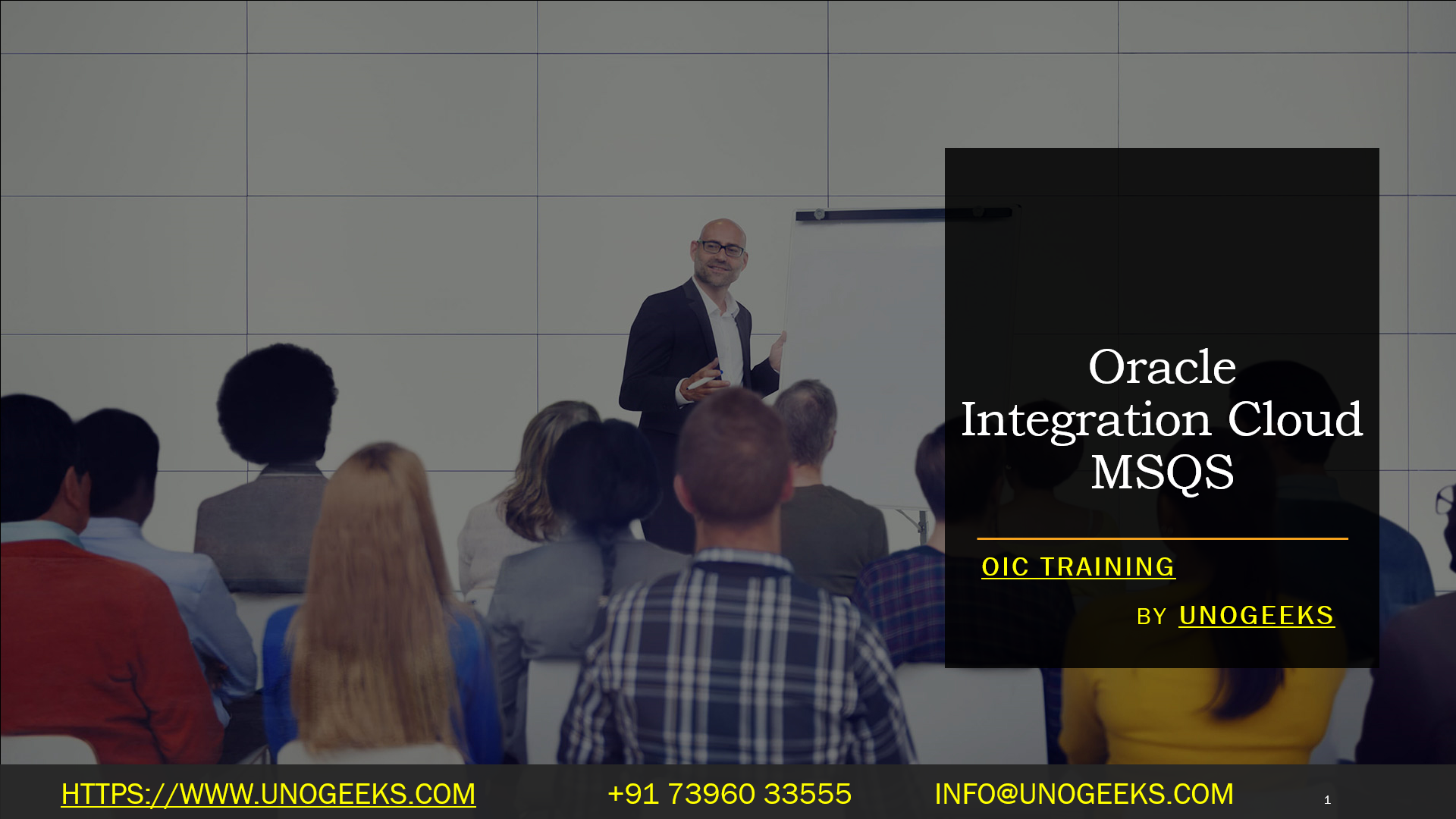Oracle Integration Cloud MSQS
Question 1: What is Oracle Integration Cloud (OIC)?
A) A customer relationship management (CRM) software. B) A platform for managing and analyzing big data. C) An integration platform as a service (iPaaS) offering. D) An enterprise resource planning (ERP) solution.
Question 2: Which of the following integration styles does Oracle Integration Cloud support?
A) Only point-to-point integrations. B) Only batch processing. C) Only synchronous integrations. D) Both real-time and batch integrations.
Question 3: What role does Oracle Visual Builder play in Oracle Integration Cloud?
A) It is used for creating complex integrations between cloud and on-premises applications. B) It provides tools for designing and developing user interfaces for applications. C) It is a monitoring and analytics tool for tracking integration performance. D) It is a virtualization tool for managing cloud resources.
Question 4: Which Oracle Integration Cloud feature is used to design and configure integrations using a web-based interface?
A) Oracle SOA Suite B) Oracle Integration Adapters C) Oracle Integration Designer D) Oracle Integration Designer Studio
Question 5: Which type of connectivity agent is used in Oracle Integration Cloud to establish connectivity with on-premises applications and systems?
A) Integration Agent B) Connectivity Agent C) Hybrid Agent D) On-Premises Agent
Question 6: What is the purpose of Oracle Integration Insight?
A) It’s a feature for managing user access and security in Oracle Integration Cloud. B) It’s a tool for designing and testing REST APIs. C) It’s a feature for monitoring and analyzing business process instances and integrations. D) It’s a reporting tool for generating financial statements.
Question 7: Which standards are commonly used for defining integrations in Oracle Integration Cloud?
A) XML and JSON B) Java and C# C) HTML and CSS D) SQL and PL/SQL
Question 8: What is Oracle’s recommended approach for migrating integrations from development to production in Oracle Integration Cloud?
A) Manually rewriting the integrations in the production environment. B) Exporting and importing the integrations using service providers. C) Rebuilding integrations from scratch in the production environment. D) There is no recommended approach for migration.
Question 9: Which Oracle Cloud service can be integrated with Oracle Integration Cloud for extending applications and creating custom workflows?
A) Oracle Database Cloud B) Oracle Functions C) Oracle Cloud Infrastructure (OCI) D) Oracle Process Cloud Service
Question 10: What is the primary benefit of using Oracle Integration Cloud for integration projects?
A) It requires no technical expertise to set up and use. B) It provides free licenses for all Oracle Cloud customers. C) It enables seamless integration between cloud and on-premises applications. D) It’s a standalone application and doesn’t require integration with other systems.
Answers:
- C) An integration platform as a service (iPaaS) offering.
- D) Both real-time and batch integrations.
- B) It provides tools for designing and developing user interfaces for applications.
- C) Oracle Integration Designer.
- D) On-Premises Agent.
- C) It’s a feature for monitoring and analyzing business process instances and integrations.
- A) XML and JSON.
- B) Exporting and importing the integrations using service providers.
- B) Oracle Functions.
- C) It enables seamless integration between cloud and on-premises applications.
Oracle Integration Cloud (OIC) Training Demo Day 1
Conclusion:
Unogeeks is the No.1 Training Institute for OIC. Anyone Disagree? Please drop in a comment
Please check our Oracle Integration Cloud Training Details here OIC Training
You can check out our other latest blogs on Oracle Integration Cloud in this OIC Blogs

———————————-
For Training inquiries:
Call/Whatsapp: +91 73960 33555
Mail us at: info@unogeeks.com
Our Website ➜ https://unogeeks.com
Follow us:
Instagram: https://www.instagram.com/unogeeks
Facebook: https://www.facebook.com/UnogeeksSoftwareTrainingInstitute
Twitter: https://twitter.com/unogeeks
